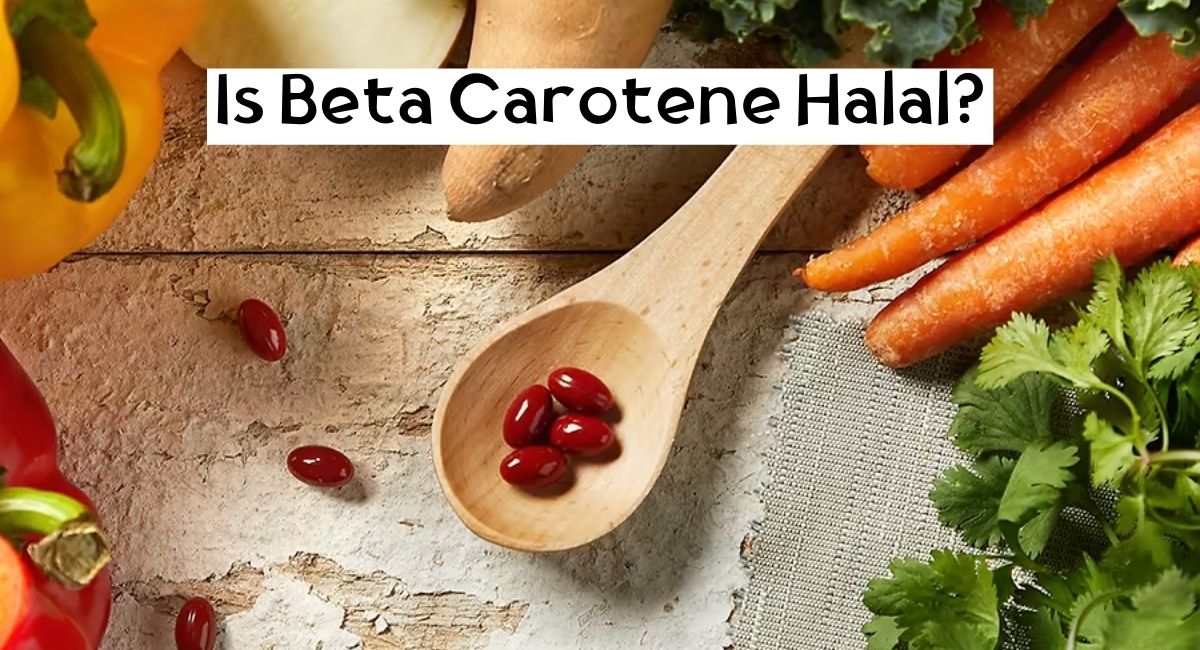Carotene is a popular natural colouring agent used in food production, and many are asking the question: Is Beta Carotene Halal? The answer to this depends on various factors such as the source of the Beta Carotene and how it was produced. In this blog post, we will be exploring all aspects of Beta Carotene to help you make an informed decision about its Halal status. We will be discussing the sources of Beta Carotene, its production process, and whether it is permissible according to Islamic laws. So keep reading to find out if Beta Carotene is halal or not!
Beta Carotene
Beta-carotene is a naturally occurring carotenoid found in many fruits and vegetables. It’s an antioxidant that works to protect cells from damage caused by free radicals, which are molecules that can cause inflammation and other harmful health effects. Beta-carotene also helps support immune system health, as well as promoting healthy skin and eyesight. It is a precursor to Vitamin A, meaning it can be turned into Vitamin A in the body.
Beta-carotene can be found in many foods including sweet potatoes, carrots, squash, cantaloupe, spinach, kale, collard greens and apricots. It is also available as a supplement or as an additive in fortified food products, such as breakfast cereals. When consumed, beta-carotene is converted to Vitamin A in the body, making it a valuable source of nutrition.
In addition to its potential health benefits, Beta-carotene has been studied for its ability to act as a natural sunscreen and protect the skin from sun damage. Researchers have suggested that beta-carotene could help reduce the risk of certain types of skin cancer, such as melanoma. It has also been studied for its potential to improve vision and reduce the risk of age-related macular degeneration.
Overall, Beta-carotene is a powerful antioxidant that can help support overall health and well-being. It is found naturally in many fruits and vegetables, as well as available in fortified foods or supplements. Eating a diet rich in beta-carotene could potentially provide protection from free radical damage, while also providing numerous other benefits.
What Is Beta Carotene Made Of?
Beta carotene is a type of pigment called a provitamin. It’s found in many colourful fruits and vegetables, including carrots, sweet potatoes, squash, spinach, kale, apricots and cantaloupe, as well as some dark green leafy vegetables like Swiss chard and collard greens.
Chemically, beta-carotene is a type of compound known as a carotenoid. It’s composed of two molecules of monoterpene — an organic compound found naturally in plants that has a strong citrusy smell. When ingested, the human body converts beta carotene into Vitamin A (retinol), which plays an important role in maintaining healthy eyesight and skin.
Beta carotene is also a powerful antioxidant, meaning it can neutralize molecules called free radicals that can cause damage to cells in the body. In addition, research suggests that regular consumption of beta-carotene-rich foods may help protect against certain types of cancer, as well as heart disease and other chronic illnesses.
For these reasons, beta-carotene is an important nutrient for overall health and well-being. Adding more fruits and vegetables rich in beta-carotene to your diet is a great way to ensure you get enough of this essential nutrient on a regular basis.
So, while beta carotene may be made of two monoterpene molecules and a carotenoid compound, it’s far more than just the sum of its parts. It’s an important nutrient with multiple health benefits that can help keep our bodies functioning optimally. Eating plenty of beta-carotene-rich foods is a simple and effective way to ensure you’re getting enough of this essential nutrient.
Is Beta Carotene Halal?
Yes, beta carotene is halal. Beta Carotene is a natural precursor of Vitamin A and is found in fruits and vegetables such as carrots, sweet potatoes, spinach, kale and other green leafy vegetables. It can also be taken as a supplement in tablet or capsule form. As it is derived from natural sources, it is permissible for consumption in accordance with Islamic dietary laws.
Beta carotene is also used in food products as a colouring agent and preservative, but manufacturers must use halal ingredients to make the product halal. It is important to read labels carefully and look for a reliable source of halal certification when purchasing food products containing beta carotene.
In conclusion, beta-carotene is halal and permissible for consumption according to Islamic dietary laws. However, caution should be taken when consuming products that contain beta carotene, as they must meet certain requirements in order to be considered halal. It is important to read labels carefully and look for a reliable source of halal certification when purchasing food items containing beta carotene.
Conclusion
In conclusion, although there is no definitive answer as to whether or not beta carotene is halal, it can be said that in general, it is considered permissible when derived from plant sources. This means that people of the Islamic faith may consume products containing beta-carotene without worry. However, any individual who wishes to avoid any potential should read product labels carefully to confirm that the beta carotene has been derived from plant sources only.
It is also important to consider other ingredients when determining whether a product is halal, as certain animal products may be present. Ultimately, it is up to each individual Muslim to decide what type of products they are comfortable consuming.






